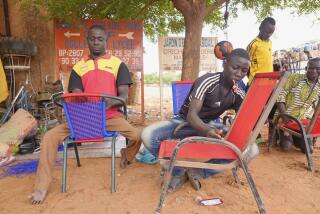BRIEFING BOOK : An African Force Heads for Liberia
- Share via
The News:
Five West African nations are sending a military task force to Liberia in a regional effort to end that country’s seven-month civil war, which has cost more than 5,000 lives and turned 400,000 persons into refugees.
Nigeria, Guinea, Sierra Leone, Ghana, and Togo--all, ironically, headed by military governments and operating under the banner of the Economic Community of West African States--are commiting troops to a task force totaling some 2,500 men. It is expected to land in Liberia sometime this week to a reception that is at best uncertain.
The besieged, 10-year-old government of Samuel Kanyon Doe has said it welcomes the intervention. So has Prince Johnson, the leader of one of two principal rebel groups now threatening the capital. But Charles Taylor, the rebel leader who originally challenged Doe, has threatened to oppose the mission by force and has mounted a new offensive in a drive to take power before the outside troops arrive.
The Background:
Taylor, a former Cabinet minister in Doe’s government, invaded Liberia on Christmas Eve, 1989, from neighboring Ivory Coast with a rump force of about 200 ex-army men, most of them lightly armed. The rebel leader and some of his men had received training in Libya.
The invasion was given little chance of unseating Doe until the president reacted by sending troops into rural areas to attack civilians of the Gio and Mano tribes, supporters of Taylor. By the time the force reached the Liberia coast and approached the capital of Monrovia, it was thousands strong, and the panicky, ill-trained government army was melting away.
Johnson’s splinter group of rebels was the first to make headway into Monrovia, but it has since become bogged down by opposition from the government and by a sideshow battle with Taylor’s forces.
What was billed as Doe’s last stand has now lasted more than two months, as his army--probably fearful of reprisals if either Taylor or Johnson wins--has fought with unexpected resolve in Monrovia.
The Players:
Samuel K. Doe was a lowly master sergeant when he seized power in April, 1980, from elected President William R.
Tolbert, who was part of a Liberian elite descended from the freed American slaves who founded the country in 1847. Tolbert died in the coup, and in the next few days Doe executed 13 former ministers. Since then he has presided over the collapse of the Liberian economy and over a farcically incompetent and violent government.
Charles Taylor was head of the General Services Agency, the government purchasing arm, and a deputy minister for commerce under Doe when he fled the country to the U.S. after a falling out. He was arrested in Boston at the request of Doe, who charged him with embezzling nearly $1 million from the GSA. (Associates believe he did steal heavily.) He told friends he escaped from U.S. custody by bribing prison guards with $30,000. “Everybody hates Doe so much--that’s why Charles Taylor, who doesn’t have a popular following, can succeed,” says one acquaintance.
Prince Johnson was a lieutenant in Doe’s army but defected when Doe stole the 1985 presidential
election, joining a coup attempt by former army officer Thomas Qwiwonkpa.
Estimates of the relative troop strengths of the three antagonists vary widely, but certainly number no more than a few thousand fighters each.
The Task Force:
The five-nation task force is charged with imposing and monitoring a cease-fire in Monrovia and setting the stage for free elections within a year. Doe, Taylor and Johnson will all be asked to lay down their arms and wouldn’t be permitted to join an interim government.
Of the task force participants, Guinea and Sierra Leone are Liberian neighbors, Ghana and Togo have many nationals working within Liberia’s borders, and Nigeria is the region’s military powerhouse. Nigeria’s president Ibrahim Babangida, however, has also been a close friend of the Doe regime. Accordingly, Nigeria’s share of the task force was scaled back lest it inspire suspicion among Liberians.
The entire mission is under the command of a Ghanaian.
Still, some prominent Liberian exiles have expressed concerns about the resolve of five military governments to reestablish civilian rule in Liberia. “It’s bound to be tricky,” says one.
The task force may be a budget-buster for its destitute African members. Early estimates place the price at $50 million or more, jeopardizing internationally imposed austerity measures in Sierra Leone and other countries. Nigeria has already requested financial and logistics aid from the U.S. and European countries.
The U.S. View:
America’s special relationship with Liberia dates back to the West African country’s independence in 1847 as the creation of a group of freed U.S. slaves. The United States has operated Voice of America transmitter stations in the country, financed many major projects and generally propped up its regimes. Huge concessions to grow rubber and mine iron ore were granted to American corporations, although now the iron mines are depleted and the giant Firestone rubber plantation, the world’s largest, changed hands when Firestone was purchased by Japan-based Bridgestone some years ago.
The Outlook:
Given the savagery of this year’s inter-tribal conflict, few Liberians believe peace can come to their country without the help of an outside force. The 2,500-man task force may not be strong enough to do its job, however, particularly if Taylor makes good on his threat to oppose the mission.
To many Liberians, the top priority is simply to somehow get rid of Doe. “With him out, there’s a good chance for a cessation of hostilities,” says Amos Sawyer, a former politician and University of Liberia dean now in exile in the United States.
More to Read
Sign up for Essential California
The most important California stories and recommendations in your inbox every morning.
You may occasionally receive promotional content from the Los Angeles Times.












